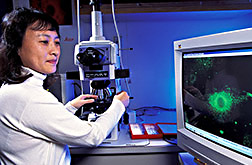This page has been archived and is being provided for reference purposes only. The page is no longer being updated, and therefore, links on the page may be invalid.
|
|
Testing Your Zinc: Is the ZIP1 Gene the Best Choice?
By Marcia WoodAugust 22, 2005
Zinc from foods like beef, oysters, dark-meat poultry and sunflower seeds helps us grow and keeps our brains and immune systems functioning. This essential mineral might best be measured with a test based on the activity of a gene called ZIP1. That's according to Agricultural Research Service (ARS) research geneticist Liping Huang and colleagues.
Right now, physicians and nutrition researchers don't have a zinc test that's easy to use, sensitive, fast and reliable. A test based on the ZIP1 gene might fill that gap.
The gene contains instructions that cells use to form a protein of the same name. When cells need zinc, the ZIP1 protein can shuttle zinc from the bloodstream, through the cell membrane and into the cell.
|
|
Twenty-five healthy females, age 20 to 25 or 64 to 75, volunteered for a ZIP1 study. About half of the women took a 22-milligram zinc supplement every day. The others did not. All volunteers ate their usual meals, which provided about 7 milligrams of zinc daily.
Scientists checked white blood cell samples taken at the beginning and end of the study. Their intent? To determine whether ZIP1 gene activity was affected by zinc supplementation.
At study's end, the ZIP1 gene was less active in the white blood cells of the zinc-supplemented volunteers than in their counterparts. This suggests that ZIP1 gene activity reflects the amount of zinc in the test cells.
Huang is continuing the ZIP1 research, which she and colleagues described in the Journal of Nutrition in 2004. Huang, based at the ARS Western Human Nutrition Research Center in Davis, Calif., collaborated on the work with nutrition center chemist Leslie R. Woodhouse; Karl B. Adree, formerly at the center; and with co-investigators from the University of California at Davis, University of California Davis Medical Center, Children's Hospital Oakland (Calif.) Research Institute, and Seoul (South Korea) National University.
ARS is the U.S. Department of Agriculture's chief scientific research agency.


